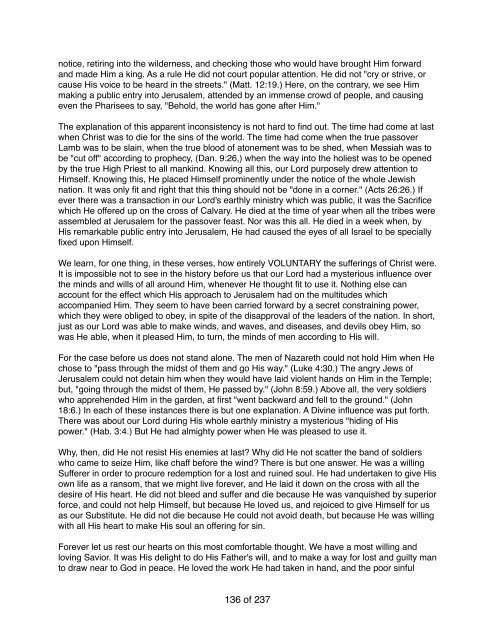J. C. Ryle John
John Charles Ryle (May 10, 1816 - June 10, 1900) was an evangelical Anglican clergyman and first Bishop of Liverpool. He was renowned for his powerful preaching and extensive tracts.
John Charles Ryle (May 10, 1816 - June 10, 1900) was an evangelical Anglican clergyman and first Bishop of Liverpool. He was renowned for his powerful preaching and extensive tracts.
You also want an ePaper? Increase the reach of your titles
YUMPU automatically turns print PDFs into web optimized ePapers that Google loves.
notice, retiring into the wilderness, and checking those who would have brought Him forward<br />
and made Him a king. As a rule He did not court popular attention. He did not "cry or strive, or<br />
cause His voice to be heard in the streets." (Matt. 12:19.) Here, on the contrary, we see Him<br />
making a public entry into Jerusalem, attended by an immense crowd of people, and causing<br />
even the Pharisees to say, "Behold, the world has gone after Him."<br />
The explanation of this apparent inconsistency is not hard to find out. The time had come at last<br />
when Christ was to die for the sins of the world. The time had come when the true passover<br />
Lamb was to be slain, when the true blood of atonement was to be shed, when Messiah was to<br />
be "cut off" according to prophecy, (Dan. 9:26,) when the way into the holiest was to be opened<br />
by the true High Priest to all mankind. Knowing all this, our Lord purposely drew attention to<br />
Himself. Knowing this, He placed Himself prominently under the notice of the whole Jewish<br />
nation. It was only fit and right that this thing should not be "done in a corner." (Acts 26:26.) If<br />
ever there was a transaction in our Lord's earthly ministry which was public, it was the Sacrifice<br />
which He offered up on the cross of Calvary. He died at the time of year when all the tribes were<br />
assembled at Jerusalem for the passover feast. Nor was this all. He died in a week when, by<br />
His remarkable public entry into Jerusalem, He had caused the eyes of all Israel to be specially<br />
fixed upon Himself.<br />
We learn, for one thing, in these verses, how entirely VOLUNTARY the sufferings of Christ were.<br />
It is impossible not to see in the history before us that our Lord had a mysterious influence over<br />
the minds and wills of all around Him, whenever He thought fit to use it. Nothing else can<br />
account for the effect which His approach to Jerusalem had on the multitudes which<br />
accompanied Him. They seem to have been carried forward by a secret constraining power,<br />
which they were obliged to obey, in spite of the disapproval of the leaders of the nation. In short,<br />
just as our Lord was able to make winds, and waves, and diseases, and devils obey Him, so<br />
was He able, when it pleased Him, to turn, the minds of men according to His will.<br />
For the case before us does not stand alone. The men of Nazareth could not hold Him when He<br />
chose to "pass through the midst of them and go His way." (Luke 4:30.) The angry Jews of<br />
Jerusalem could not detain him when they would have laid violent hands on Him in the Temple;<br />
but, "going through the midst of them, He passed by." (<strong>John</strong> 8:59.) Above all, the very soldiers<br />
who apprehended Him in the garden, at first "went backward and fell to the ground." (<strong>John</strong><br />
18:6.) In each of these instances there is but one explanation. A Divine influence was put forth.<br />
There was about our Lord during His whole earthly ministry a mysterious "hiding of His<br />
power." (Hab. 3:4.) But He had almighty power when He was pleased to use it.<br />
Why, then, did He not resist His enemies at last? Why did He not scatter the band of soldiers<br />
who came to seize Him, like chaff before the wind? There is but one answer. He was a willing<br />
Sufferer in order to procure redemption for a lost and ruined soul. He had undertaken to give His<br />
own life as a ransom, that we might live forever, and He laid it down on the cross with all the<br />
desire of His heart. He did not bleed and suffer and die because He was vanquished by superior<br />
force, and could not help Himself, but because He loved us, and rejoiced to give Himself for us<br />
as our Substitute. He did not die because He could not avoid death, but because He was willing<br />
with all His heart to make His soul an offering for sin.<br />
Forever let us rest our hearts on this most comfortable thought. We have a most willing and<br />
loving Savior. It was His delight to do His Father's will, and to make a way for lost and guilty man<br />
to draw near to God in peace. He loved the work He had taken in hand, and the poor sinful<br />
136 of 237




